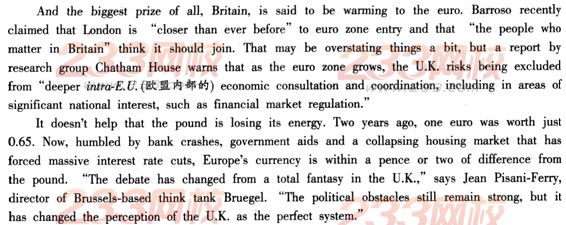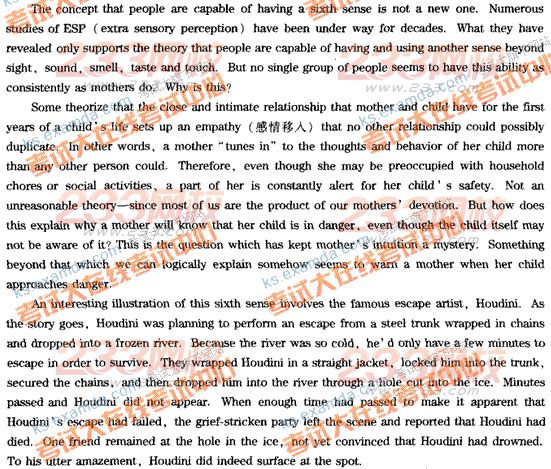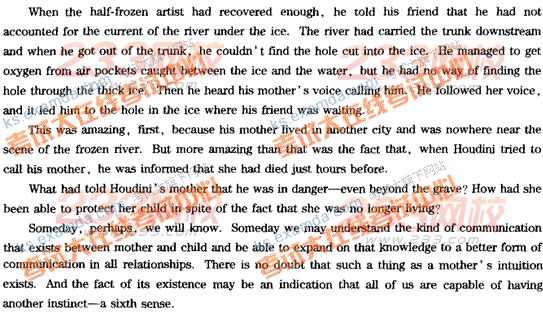цЈчАхЈчфНчНЎяМ233чНц Ё >> шБшЏхчКЇшшЏ >> шБшЏхчКЇщЂхК >> цЏцЅфИчЛ >> цчЋ х
хЎЙ
2014хЙДшБшЏхчКЇшшЏцЏцЅфИчЛ(6ц24цЅ)
хЏМшЏЛ:
хЈчКПцЕшЏцЌцЙуцЏцЅфИчЛушЏщЂяМхЏцЅччцЁхшЇЃцяМхЙЖфПчхщЂшЎАхН >> хЈчКПхщЂ
- чЌЌ1щЁЕяМчЛфЙ шЏщЂ
хщЁЙщцЉщЂ
1уц ЙцЎфИшПАццхчщЂяМ



It is mentioned in the first paragraph that Kosovo__________.

хЁЋчЉКщЂ
2уIt is essential that every child__________(цхц ЗчцшВцКфМ)яМ
3уOnly then________ (шЋхІЎхЁццшЏхАхЅЙцхЄчБхЅЙчфИхЄЋ)яМ
4уThe results of the Leeds University's test show that __
[A] the less a man focuses on others, the higher he scores
[B] men didn't score any higher than women
[C] contagious yawning and empathy are related to the same parts of the brain
[D] it explained the link between contagious yawning and empathy
5уWhen he realized the police had spotted him, the man made _____________ (хАНхПЋцхКхЃшЕАхЛ).
6у Hardly had he finished his work__________(чЕшЏхАБхфК)яМ
7уц ЙцЎфИхццшЏЗхчщЂяМ



What is the focus of this passage?

чЎчщЂ
8ухІфЛяМшЖцЅшЖхЄчхЄЇхІчцБцЈхОщОцОхАхЅНхЗЅфНущ цшПфИчАшБЁчхх хІфИяМщІх яМхЄЇхІчцхЈц ЁчхЄЇхЄцАцЖщДщНчЈхЈфКфИфИхІчЇхІфЙ фИяМхЊцхНфЛфЛЌхМхЇцОхЗЅфНчцЖхяМццшЏхАшЊхЗБчМКфЙхП шІчшфИхЙшЎух ЖцЌЁяМхЄЇхІчфЙщДччЋфКфЙшЖцЅшЖцПчяМшПхЏМшДфЛЛфНфИххЄЇхІчцОхАхЗЅфНчцКфМщНххАфКух цЄяМхМКчхЛКшЎЎхЄЇхІчхЈшЏОфНцЖщДхфИфКх МшхЗЅфНяМфЛЅчЇЏчДЏчИх ГчхЗЅфНчЛщЊу
9уфИхНшДхфКхЛКшЎОхНхЎЖхцАфНчГЛяМщшПшЅщ шЏхЅНччЏхЂяМцЈшПчЅшЏхцАуццЏхцАхфНхЖхцАуфИхНцПхКцЏцчЇхІхЎЖфИКфКхНхЎЖщцБхчЇхІххБхМхБхКчЁч чЉЖяМщМхБфЛфЛЌшПшЁтхЅНхЅхПщЉБхЈчч чЉЖтухЈцЊцЅ50хЙДчшГцДщПчцЖцщяМфИхНчххБхАхЈхОхЄЇчЈхКІфИфОшЕфКфЛхЄЉхКчЁч чЉЖхщЋццЏч чЉЖчхцАцхАБяМфОшЕфКшПфКч чЉЖфИцхП чЖхшВчфККцу
10у
AяМSwamped (хПчЂч), under the gun, just struggling to stay above water...; whateveroffice cliche you employto depict it. we've all been in that situation where wefeel like we might be swallowed up by our workload.Nonetheless many a way maybe used to manage your to-do list to prevent feeling overwhelmed. How tomakepeace with your workload once and for all goes as follows.
BяМGetorganized. "Clear the deadwood outof your desk and keep your office in shape, which enhances yourcapability tohandle other tasks and raises the probability that you'll retrieve the itemsyou do need in a fasterand easier fashion," says Jeff Davidson who worksas a work/life expert and writer of more than 50 books onworkplace issues."When something can be disposed, let i! go, given in reality most of whatyou retain isreplaceable." Joel Rudy, vice president of operations forPhotographic Solutions, with better than thirty yearsof business managementexperience, believes that keeping organized is a must. "Messy work areas arenonproductive insome measure. Provided that you can't locate a document or report easily becauseit's lost inу apile of mess, then you have a problematic situation," he says."Thereby you are supposed to take the time totidy up your work areas andkeep your important files, manuals and reports in an accessible location,whichwill maximize your efficiencies."
CяМMake ato-do list, then cover it up. It may sound weird, but it works, says JessicaCarlson, an accountexecutive at Bluefish Design Studio which is an advertisingconsulting firm. Carlson urges her team to utilizeto-do lists to stay on trackand highlight items that are a priority. "Cover up the list, with theexception of onehigh-priority task at one time," she suggests. "This will allow you to focus better onthe task at hand;otherwise, it will be easy to get overwhelmed if you're readingthrough a to-do list that spans an entire page.Concentrating on a single itemwill make your tasks appear like they are more doable," Carlson says.
DяМStopmultitasking. Despite what you may consider multitasking, it'scounterproductive. Unless you're drinkingcoffee while scanning your morninge-mails, you're not saving any time by attempting to do ten things atonce. "If you find yourself getting tangled intoo many things, it may be of much necessity of you to re-- evaluate yourinvolvement," Rudy says. "Your mind will wander from one topic toanother and you.may endup never accomplishing a thing." Rudy recommendsthe best way to stop multitasking is to create priority listswith deadlines."When applicable, complete one project before you move further on to thenext one," he says.
EяМSet timelimits. Deborah Chaddock-Brown, a work-at-home s'.mgle parent, says she'sfrequently overwhelmedby the demands of maintaining order in her residence andrunning her own business. Still, she manages to "doit all" by settinga time limit for each task. "I have the type of personality thatflits (шНЛшНЛхАц шП)from thingto thing because I do have so much on my plate,"Brown says. "As a consequence I assign time slots: For thenext 15 minutesI will participate in Social media for the purpose of marketing mybusiness (not sendingphotos or playingFarmville)and that is the only thing I am about to do for the next 15 minutes.When thetime is up, I move on to the next task. That way, at night I don't endup with a pile of tasks to accomplish eventhough I felt busy all day."
FяМTalk toyour manager. "Quite often, peopleare working on things that are no longer a top priority, butsomeone forgot totell them (that they're no longerimportant). There are usually clear priorities in themanager's head; he or shehas just not done a great job communicating those with the employee," saysHollyGreen, CEO of The Human Factor. Green's suggestion unfoldsin thismanner: "If you find yourselfconfrontedwith too many responsibilitieS, sit downяМ note the significantthings you are in charge of, and go toyour manager to have a conversation todiscuss priorities, trade-offs, timecommitments andinterdependencies required to do each thing well, and then ask whatyou should stop working on or work onless so you can get the right thingsdone." Greefi says managers should be willing to help sort out priorities,solong as employees have a can-do approach and aren't just complaining abouttheir workload.
GяМEliminatetime wasters. "If interruptions are l keeping you from yourresponsibilities, learn how to deal withthem accordingly," says EileenRoth, author of Organizing for Dummies. Roth proposes the followingsuggestionsto combat disruptions: "Use voicemail to cut down on telephone interruptions, turn offthe alertthat says "You've got an e-mail' and give staffmembers a set time to visit you." Justin Gramm, president ofGlobellaBuyers Realty, exemplifies Roth's point. "E-mail had been a big time waster for me in the pastbecause it wasa constant interruption, causing me to lose focus on the task at hand," hesays. Sincedetermined to check his e-mails only twice a day, Gramm says he hasbecome much more efficient. "If peoplewant to get more work done, theyneed to stop checking e-mails and get down to business," he says.
HяМAssessyour workload before taking on new tasks. "The paradox of today's workenvironment is that the moreyou do, the more that's expected of you,"Davidson says. In order to better assess your workload, Davidsonsuggests askingyourself the following questions before agreeing to undertake newresponsibilities: Is the taskaligned (фНПфИшД)with your prioritiesand goals; Are you likely to be as prone to saying yes to such arequesttomorrow or next week; what else could you do that would be morerewarding; what other pressing tasks andresponsibilities are you likely toface; Does the other party have options other than you; Will he or shebecrushed if you say no?
IяМWant to know more? Most of our expertsrecommended books for additional tips on how to maximizeefficiency, but onebook was mentioned time and again. Check out The Seven Habits of HighlyEffectivePeople.
"The more you do, the more you are expected to do" has been a paradoxin today's work environment.
1уц ЙцЎфИшПАццхчщЂяМ



It is mentioned in the first paragraph that Kosovo__________.

хЁЋчЉКщЂ
2уIt is essential that every child__________(цхц ЗчцшВцКфМ)яМ
3уOnly then________ (шЋхІЎхЁццшЏхАхЅЙцхЄчБхЅЙчфИхЄЋ)яМ
4уThe results of the Leeds University's test show that __
[A] the less a man focuses on others, the higher he scores
[B] men didn't score any higher than women
[C] contagious yawning and empathy are related to the same parts of the brain
[D] it explained the link between contagious yawning and empathy
5уWhen he realized the police had spotted him, the man made _____________ (хАНхПЋцхКхЃшЕАхЛ).
6у Hardly had he finished his work__________(чЕшЏхАБхфК)яМ
7уц ЙцЎфИхццшЏЗхчщЂяМ



What is the focus of this passage?

чЎчщЂ
8ухІфЛяМшЖцЅшЖхЄчхЄЇхІчцБцЈхОщОцОхАхЅНхЗЅфНущ цшПфИчАшБЁчхх хІфИяМщІх яМхЄЇхІчцхЈц ЁчхЄЇхЄцАцЖщДщНчЈхЈфКфИфИхІчЇхІфЙ фИяМхЊцхНфЛфЛЌхМхЇцОхЗЅфНчцЖхяМццшЏхАшЊхЗБчМКфЙхП шІчшфИхЙшЎух ЖцЌЁяМхЄЇхІчфЙщДччЋфКфЙшЖцЅшЖцПчяМшПхЏМшДфЛЛфНфИххЄЇхІчцОхАхЗЅфНчцКфМщНххАфКух цЄяМхМКчхЛКшЎЎхЄЇхІчхЈшЏОфНцЖщДхфИфКх МшхЗЅфНяМфЛЅчЇЏчДЏчИх ГчхЗЅфНчЛщЊу
9уфИхНшДхфКхЛКшЎОхНхЎЖхцАфНчГЛяМщшПшЅщ шЏхЅНччЏхЂяМцЈшПчЅшЏхцАуццЏхцАхфНхЖхцАуфИхНцПхКцЏцчЇхІхЎЖфИКфКхНхЎЖщцБхчЇхІххБхМхБхКчЁч чЉЖяМщМхБфЛфЛЌшПшЁтхЅНхЅхПщЉБхЈчч чЉЖтухЈцЊцЅ50хЙДчшГцДщПчцЖцщяМфИхНчххБхАхЈхОхЄЇчЈхКІфИфОшЕфКфЛхЄЉхКчЁч чЉЖхщЋццЏч чЉЖчхцАцхАБяМфОшЕфКшПфКч чЉЖфИцхП чЖхшВчфККцу
10у
хчщЂяМ
How to Make Peace with Your WorkloadBяМGetorganized. "Clear the deadwood outof your desk and keep your office in shape, which enhances yourcapability tohandle other tasks and raises the probability that you'll retrieve the itemsyou do need in a fasterand easier fashion," says Jeff Davidson who worksas a work/life expert and writer of more than 50 books onworkplace issues."When something can be disposed, let i! go, given in reality most of whatyou retain isreplaceable." Joel Rudy, vice president of operations forPhotographic Solutions, with better than thirty yearsof business managementexperience, believes that keeping organized is a must. "Messy work areas arenonproductive insome measure. Provided that you can't locate a document or report easily becauseit's lost inу apile of mess, then you have a problematic situation," he says."Thereby you are supposed to take the time totidy up your work areas andkeep your important files, manuals and reports in an accessible location,whichwill maximize your efficiencies."
CяМMake ato-do list, then cover it up. It may sound weird, but it works, says JessicaCarlson, an accountexecutive at Bluefish Design Studio which is an advertisingconsulting firm. Carlson urges her team to utilizeto-do lists to stay on trackand highlight items that are a priority. "Cover up the list, with theexception of onehigh-priority task at one time," she suggests. "This will allow you to focus better onthe task at hand;otherwise, it will be easy to get overwhelmed if you're readingthrough a to-do list that spans an entire page.Concentrating on a single itemwill make your tasks appear like they are more doable," Carlson says.
DяМStopmultitasking. Despite what you may consider multitasking, it'scounterproductive. Unless you're drinkingcoffee while scanning your morninge-mails, you're not saving any time by attempting to do ten things atonce. "If you find yourself getting tangled intoo many things, it may be of much necessity of you to re-- evaluate yourinvolvement," Rudy says. "Your mind will wander from one topic toanother and you.may endup never accomplishing a thing." Rudy recommendsthe best way to stop multitasking is to create priority listswith deadlines."When applicable, complete one project before you move further on to thenext one," he says.
EяМSet timelimits. Deborah Chaddock-Brown, a work-at-home s'.mgle parent, says she'sfrequently overwhelmedby the demands of maintaining order in her residence andrunning her own business. Still, she manages to "doit all" by settinga time limit for each task. "I have the type of personality thatflits (шНЛшНЛхАц шП)from thingto thing because I do have so much on my plate,"Brown says. "As a consequence I assign time slots: For thenext 15 minutesI will participate in Social media for the purpose of marketing mybusiness (not sendingphotos or playingFarmville)and that is the only thing I am about to do for the next 15 minutes.When thetime is up, I move on to the next task. That way, at night I don't endup with a pile of tasks to accomplish eventhough I felt busy all day."
FяМTalk toyour manager. "Quite often, peopleare working on things that are no longer a top priority, butsomeone forgot totell them (that they're no longerimportant). There are usually clear priorities in themanager's head; he or shehas just not done a great job communicating those with the employee," saysHollyGreen, CEO of The Human Factor. Green's suggestion unfoldsin thismanner: "If you find yourselfconfrontedwith too many responsibilitieS, sit downяМ note the significantthings you are in charge of, and go toyour manager to have a conversation todiscuss priorities, trade-offs, timecommitments andinterdependencies required to do each thing well, and then ask whatyou should stop working on or work onless so you can get the right thingsdone." Greefi says managers should be willing to help sort out priorities,solong as employees have a can-do approach and aren't just complaining abouttheir workload.
GяМEliminatetime wasters. "If interruptions are l keeping you from yourresponsibilities, learn how to deal withthem accordingly," says EileenRoth, author of Organizing for Dummies. Roth proposes the followingsuggestionsto combat disruptions: "Use voicemail to cut down on telephone interruptions, turn offthe alertthat says "You've got an e-mail' and give staffmembers a set time to visit you." Justin Gramm, president ofGlobellaBuyers Realty, exemplifies Roth's point. "E-mail had been a big time waster for me in the pastbecause it wasa constant interruption, causing me to lose focus on the task at hand," hesays. Sincedetermined to check his e-mails only twice a day, Gramm says he hasbecome much more efficient. "If peoplewant to get more work done, theyneed to stop checking e-mails and get down to business," he says.
HяМAssessyour workload before taking on new tasks. "The paradox of today's workenvironment is that the moreyou do, the more that's expected of you,"Davidson says. In order to better assess your workload, Davidsonsuggests askingyourself the following questions before agreeing to undertake newresponsibilities: Is the taskaligned (фНПфИшД)with your prioritiesand goals; Are you likely to be as prone to saying yes to such arequesttomorrow or next week; what else could you do that would be morerewarding; what other pressing tasks andresponsibilities are you likely toface; Does the other party have options other than you; Will he or shebecrushed if you say no?
IяМWant to know more? Most of our expertsrecommended books for additional tips on how to maximizeefficiency, but onebook was mentioned time and again. Check out The Seven Habits of HighlyEffectivePeople.
"The more you do, the more you are expected to do" has been a paradoxin today's work environment.
чИх
ГцЈш
шЏОчЈх
шДЙшЏхЌ
| ПЮГЬзЈвЕУћГЦ | НВЪІ | дМл/гХЛнМл | УтЗбЬхбщ | БЈУћ |
|---|---|---|---|---|
| ЁЖДѓбЇгЂгяЫФМЖЁЗОЋЦЗАрЃЈАќРЈгяЗЈЁЂДЪЛуЁЂЗвыЃЉ | ЖЁбЉУї | ЃЄ100 / ЃЄ100 |  |
БЈУћ |
| ЁЖДѓбЇгЂгяЫФМЖЁЗОЋЦЗАрЃЈдФЖСРэНтЃЉ | ЖЁбЉУї | ЃЄ100 / ЃЄ100 |  |
БЈУћ |
| ЁЖДѓбЇгЂгяЫФМЖЁЗОЋЦЗАрЃЈЬ§СІЃЉ | ЖЁбЉУї | ЃЄ100 / ЃЄ100 |  |
БЈУћ |
| ЁЖДѓбЇгЂгяЫФМЖЁЗОЋЦЗАрЃЈаДзїЃЉ | ЖЁбЉУї | ЃЄ100 / ЃЄ100 |  |
БЈУћ |
ччЙфИщЂ







